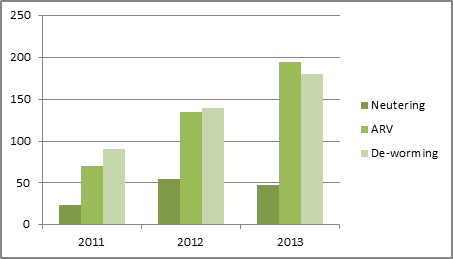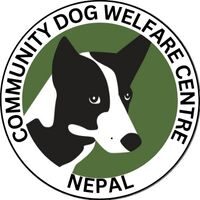Community Work
In the Kopan area many dogs are free-roaming, whether individually owned, or community dogs. A holistic approach, based on the participation of the local people, aims to change attitudes and improve the welfare of all dogs in the community.
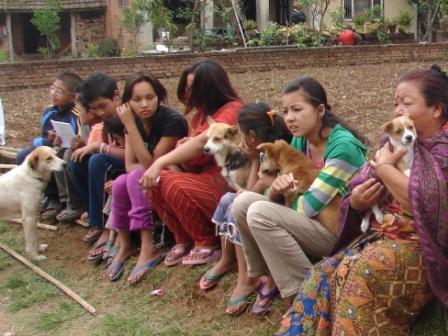
Assisting with care & treatment
Community Dog Welfare provides practical assistance with care and veterinary treatment for owned and community dogs. This has built a relationship with the local people and encourages them to care for their dogs and seek help when needed.
The Community Dog Health Programme
The Community Dog Health Programme aims to improve dog health, control rabies, manage the dog population and promote a healthy safe environment for the community. The overall goal is to develop awareness and responsibility, on the part of both the community and local government, for the management and well-being of owned and community dogs throughout Kapan VDC.
Together with Kapan VDC and Himalayan Animal Rescue Trust (HART), we hold annual dog health programmes, working with the community to build awareness and demonstrate how dog welfare relates to the whole community. Starting from Paiyutar, the plan is to progressively cover all wards of Kapan VDC. There has been a positive response with local people bringing in community dogs as well as their own for treatment. Ani Gompa and Kopan Gompa bring in their owned dogs and sponsor operations and vaccinations for the local dogs in their vicinity.
The first programme, held in May 2011, included a household survey and dog census, followed by de-worming, spaying and anti-rabies vaccination in Wards 8 and 9 of Kapan VDC. Following a request from the VDC, the programme was expanded to include Wards 6 and 7 in May 2012, and Ward 2 in 2013. The third phase was carried out in April 2013, with the VDC taking over responsibility for the anti-rabies vaccination part of the programme.
The annual Dog Health Programme caters to all dogs in the community, as many of the owned dogs are also free-roaming and intermingle with the street dogs. The aim of CDW is to improve the lives of all dogs in the community through the active participation of local people.
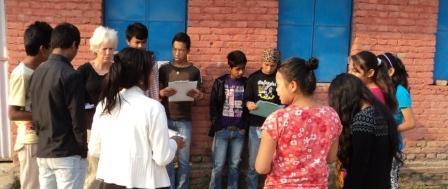
Dog Health Programme 2013
The third phase of the programme took place in April 2013. Working with the local people, in collaboration with Kapan VDC and the Himalayan Animal Rescue Trust (HART), the programme extended from Wards 6, 7, 8 and 9 covered last year, to include Ward 2. An awareness campaign was followed by a household survey, carried out on Saturday 6 April by 30 Class 9 students from Shree Yagyamati Secondary School, Payutar and Shree Gram Shichya Mandir High School, Kapan. These activities informed the households, recorded both owned and community dogs and gave people the opportunity to register their dogs for treatment. All community dogs were recorded and females identified for spaying.
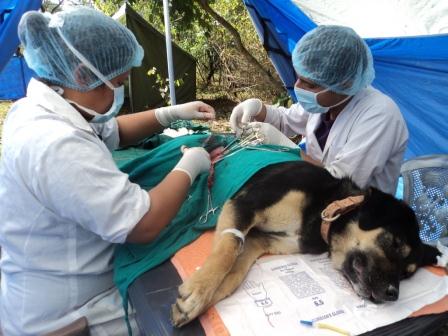
Spaying operation in the field clinic
The HART veterinary team carried out 47 spaying and neutering operations over 3 days, 17 to 19 April, in a field clinic in Paiyutar.
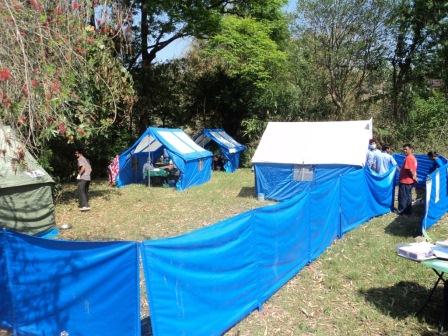
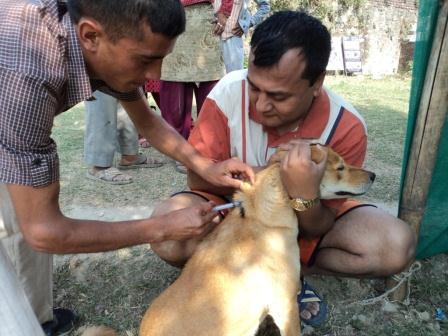
The HART veterinary team carried out 47 spaying and neutering operations over 3 days, 17 to 19 April, in a field clinic in Paiyutar.
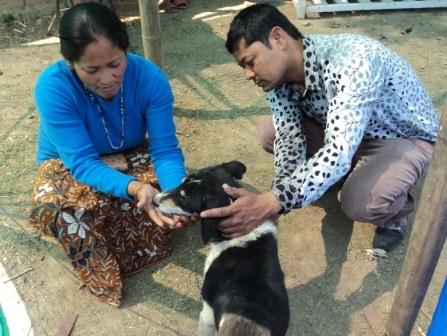
Giving de-worming tablets
De-worming of 117 dogs was carried out at two locations, Payutar Ward 8 and Bangalamukhi temple Ward 2, on Saturday 13 April. A further 63 dogs were de-wormed later, including dogs in the shelter, making a total of 180.
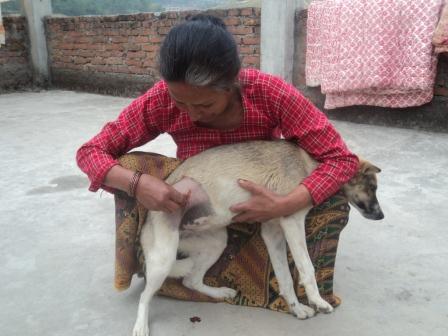
Monitoring after spaying operation
Post operation monitoring and medication was carried out by HART and Community Dog Welfare. Monitoring was conducted for two days, 20 and 21 April, while on the third day only those with problems were observed. Six dogs, 3 female and 3 male, required some treatment for minor redness, swelling, pain and infection. By the third day of monitoring, all were improving and further treatment was not expected to be needed. One female was retained in the rescue centre for a few more days after her wound opened.
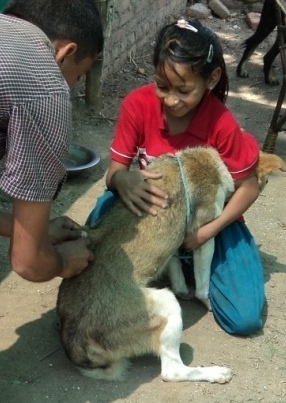
This year local government took on responsibility for the anti-rabies vaccination. 195 dogs were vaccinated on 27 April by veterinary staff from the District Livestock Office with vaccine provided by Kapan VDC. The Kapan VDC proposes to undertake the anti-rabies vaccination programme in the VDC in future years.
Programme Results 2011, 2012 and 2013
The following bar chart summarises the numbers of dogs de-wormed, neutered and vaccinated during the three phases of the programme to date.
Community Dog Welfare Kopan would like to thank Kapan VDC, Himalayan Animal Rescue Trust, Himalayan Animal Treatment Centre (HAT) UK, Kathmandu Veterinary Clinic, Linda Sherpa, Rewat Timilsina, and the student volunteers for their help and support. Above all, the success of the programme rests with the local people, including nuns and monks at the monasteries, who participated in the programme by bringing dogs both private and from the community, to be treated.
